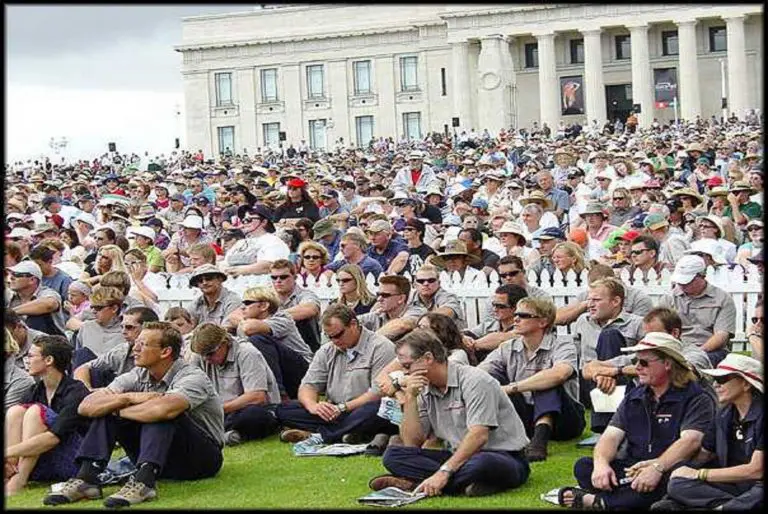“We want to restart people caring for the environment as it must be cared for. And at the same time we want to do this through adventure, through participation, through education and through enjoyment.”
– Sir Peter Blake
It is now a very sad part of history that Sir Peter Blake, K.B.E., the head of “blakexpeditions”, was tragically shot and killed on 6 December, 2001, in Macapa at the mouth of the Amazon River.
Sir Peter was buried in the St Thomas A’ Beckett Church, near his home in Emsworth, on the south coast of England, on 14 December 2001. More than 1000 people, including representatives of the British Royal Family, of the United Nations Environment Programme and of Omega, attended the service.
On 23 December, 2001, in his native New Zealand, a memorial service to Sir Peter was held in the Auckland Domain overlooking the city and the harbour where and upon which Sir Peter grew up. More than 30,000 people gathered to celebrate Sir Peter’s life and to hear tributes from such as New Zealand’s Governor General, Her Excellency The Honourable Dame Silvia Cartwight, New Zealand’s Prime Minister, the Right Honourable Helen Clark, the Kaumatua of the Ngati Whatua tribe, Sir Hugh Kawharu, and the National Secretary of Sports, Mr Lars Grael, representing His Excellency, President Fernando Henrique Cardoso of the Federative Republic of Brazil.
In excess of 100,000 people watched the service on live, nationwide television and, later in the day, an estimated 8,000 boats took part in a moving sail past on Auckland Harbour as New Zealand’s yachties bid a final farewell to their favourite son.
Throughout this period, and since, thousands upon thousands of tributes and messages of condolence to Sir Peter’s family have been pouring in from all around the world, by letter, telephone, email and facsimile.
We at “blakexpeditions” had to double the size of our server in order to cope with those messages that were communicated through our web site.
The overwhelming majority of the messages have urged strongly that the work of Sir Peter must be carried on, in his name and in his memory.
I was privileged to be one of the speakers at Sir Peter’s memorial service in New Zealand. I said:
“Sir Peter Blake, K.B.E.
“Ultimate yachtsman
“Dogged competitor
“Inspirational leader
“Consummate communicator
“Devoted husband and father
“These are just a few of the many faces of Peter Blake with which we had become familiar.
“In more recent times, however, another face of Peter had emerged – that of the passionate environmentalist.
“Peter brought passion to everything he did – even to playing scrabble on the Antarctic ice shelf during the first “blakexpeditions” voyage in Seamaster in January through March 2001.
“But never was he more passionate than in his complete determination to make a difference to the way mankind is caring for this beautiful and unique planet of ours.
“Make that the way mankind is NOT caring for this beautiful and unique planet of ours.
“For Peter had seen, in some of the most remote and environmentally sensitive regions on earth, the all-too-clear evidence that mother nature is now struggling to sustain herself against the growing and compounding levels of pollution and exploitation than mankind is heaping on her.
“It became his last great challenge to do something about that – to make a difference.
“It was as though everything else that he had achieved had been preparation and training for something far more important.
“Peter was never one to shirk a challenge and it was becoming a case of God help those responsible as he swung into action and “blakexpeditions” gained momentum.
“Peter was tragically and senselessly cut down when his “blakexpeditions” messages were just beginning to be heard, just starting to make a global impact, just beginning to make the sort of difference he wanted,
“Peter’s mission was typically uncomplicated
“As he put it, to wake people up to the fact that if we don’t all start taking better care of this world of ours, we won’t like what we are going to leave to our children.
“Well Pete, we’re not going to give up on that work.
“If there is a way to keep “blakexpeditions” going, we will find it so that your endeavours will be carried on – in your name.
“You always said, and firmly believed, that if it wasn’t difficult to achieve then why bother doing it.
“We can’t bring you back. We can never replace you.
“But we can take everything that you brought to us and package it differently so that your mission is maintained, in your memory.
“To Pippa, Sarah-Jane, and James.
“To Joyce, Tony, Jan and Liz
“You have lost a treasured husband, father, son and brother.
“Thank you so much for sharing him with us.
“I have lost an inspirational and incredibly loyal friend.
“We have all lost a remarkable individual
“A proud and special New Zealander
“A humble and caring person
“A great human being.
“We must now endeavour to ensure that he did not die in vain.”
In the short and enormously sad period since, while we have been striving to come to terms with Sir Peter’s loss, we have also begun taking the first steps towards ensuring that his work will continue, under the “blakexpeditions” banner.
This is the wish of Sir Peter’s family, Lady Pippa Blake, Sarah-Jane and James.
It is also the determined intent of myself and of my colleague Scott Chapman, who have worked closely with Sir Peter on most of his campaigns and helped him form “blakexpeditions”, of our North American associate Chris Coffin and of the crew of Seamaster.
And it reflects the overwhelming desire of the many thousands of people around the world who have been in touch since Sir Peter’s death, the great majority of whom we have never met but on whom Sir Peter and his passion for the environment have clearly made such an impact.
Our expedition vessel Seamaster is currently in Grenada in the Caribbean where she will remain in the short term while we determine the future. Her permanent crew is back aboard, after attending Sir Peter’s memorial service in New Zealand, and preparing Seamaster for the work ahead.
Our first two one-hour television documentaries, covering the expedition to the Antarctic in 2001, are now being distributed globally while post-production work on the documentaries covering the Amazon expedition is to begin shortly.
We will, in the very near future, be visiting UNEP and our sponsors to outline our plans to continue and to seek their on-going support for Sir Peter’s work.
And we are in discussion with New Zealand’s Prime Minister, Helen Clark who, at Sir Peter’s memorial service, announced that she and her government were planning a special trust in New Zealand to help support the future endeavours of “blakexpeditions.“ This initiative, we understand, is likely to receive enthusiastic support from the government of Brazil.
There is much to be done. There are many hurdles to overcome.
But, we are mindful of, and inspired by, the memory of the man who always relished and rose to a challenge, who hated leaving work unfinished, and who was so determined to make a difference to the world in which we live – Sir Peter Blake, K.B.E.
Many people have asked us what they can do to help. The massive support, and the wholesale encouragement for us to continue, has enabled us to look to the future with confidence and determination.
We will update our website regularly to keep you posted on the way forward.
Alan Sefton
“blakexpeditions”
Why are we here?
“To be able to visit the “pulse points” of the planet and report on what we see, on what we find, on what we learn through our adventures on this very special vessel of ours, Seamaster. Rather than reading about the most critical environmental areas of the world, we wanted to “see for ourselves” and form our own opinions.”
– Peter (9th October, 2001)
After two months in the Amazon, Peter had this to say:
“The environmental messages that we from time to time become quite energetic over, apply all over, the planet – not just the Amazon. The quality of water and the quality of life in all its infinite forms are critical parts of the overall ongoing health of this planet of ours, not just here in the Amazon, but everywhere.
“With nearly 50% of all of the peoples of the world now living in towns or cities, we wanted to begin the process of bringing back the appreciation of nature that may be missing from many daily lives. We want to restart people caring for the environment as it must be cared for. And at the same time we want to do this through adventure, through participation, through education and through enjoyment.”
– Peter (4th December, 2001)
“Dusk has turned the surface of the river into a greasy grey – with the sky quickly darkening after the sun’s orange and golds have gone. We always hope for a clear night, and tonight the moon will be up soon after 9pm – but this means two and a half hours of real blackness before then.
“There are flashes of lightning up ahead, with the radar showing a band of rain stretching out either side of our course. There are lights of ships, barge traffic, ferries and small towns and the flaming floating pots marking the extremities of the fishing nets to avoid.
“A cool breeze blows out of the lightning cloud and the as-yet unfelt rain. The moon is up but soon disappears behind the arriving ragged cloud – a few cold drops are felt – but then that passes, leaving us in clearing conditions, the only breeze provided by our forward speed. The rain that has fallen, before getting to us, leaves the air full of the smells of damp earth and warm vegetation.”
– Peter (4th December, 2001)


